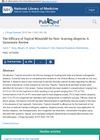Low-Dose Oral Minoxidil Increases Hair Density and Thickness in Androgenetic Alopecia: A Retrospective Analysis of 60 Patients
October 2021
in “
Journal of The European Academy of Dermatology and Venereology
”
TLDR Low-dose oral minoxidil increases hair density and thickness in people with hair loss.
The retrospective analysis of 60 patients with androgenetic alopecia demonstrated that low-dose oral minoxidil effectively increases hair density and thickness. This study, conducted by researchers at The Ronald O. Perelman Department of Dermatology, New York University Grossman School of Medicine, provides evidence supporting the use of low-dose oral minoxidil as a treatment option for hair loss. The findings are significant as they offer a potential alternative to current topical treatments, with the study involving a substantial number of participants, thereby strengthening the validity of the results.










